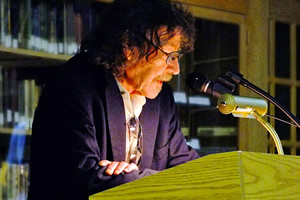March 13, 2012 The death of Tennessee novelist William Gay at his home on February 23 brought reminiscences and career retrospectives from publications around the country. Most, like the obituary in The New York Times, noted his rural roots and lack of a formal education while connecting him stylistically to Southern literary icons William Faulkner, Cormac McCarthy, and Flannery O’Connor. The Washington Post praised his “style that emphasized rhythm and mood” and quoted from Gay’s famous short story, “I Hate to See That Evening Sun Go Down.” In USA Today, critic Bob Minzesheimer wrote, “Of all the authors I’ve interviewed in the past 15 years, William Gay was far from the most popular or most quotable, but he—and his writing—are among the most memorable.”
 Closer to home, Jim Gilbert’s memorial published on Al.Com noted Gay’s natural humility and his struggle with the literary fame that made strangers feel they knew him, at least through his work: “Though lauded by the writing and reading community, Gay himself was uneasy with success and the cultish attention that sometimes came with it,” Gilbert wrote. “Like Ken Kesey in the wake of his Merry Pranksters celebrity, he viewed it as a distraction and a hindrance to creativity. Thanks to an utter lack of pretension, it was no artistic affectation that he would rather work than answer the phone or the door.”
Closer to home, Jim Gilbert’s memorial published on Al.Com noted Gay’s natural humility and his struggle with the literary fame that made strangers feel they knew him, at least through his work: “Though lauded by the writing and reading community, Gay himself was uneasy with success and the cultish attention that sometimes came with it,” Gilbert wrote. “Like Ken Kesey in the wake of his Merry Pranksters celebrity, he viewed it as a distraction and a hindrance to creativity. Thanks to an utter lack of pretension, it was no artistic affectation that he would rather work than answer the phone or the door.”
Gay’s influence on the Southern writing community was profound, and perhaps underestimated because he was innately modest and averse to self-promotion. For NewSouth Books, novelist John Pritchard addressed this phenomenon as a writer who admired Gay from afar and was thrilled when Gay agreed to write a blurb for his novel, The Yazoo Blues.
Gay often wrote for The Oxford American magazine, including a regular music column. The magazine’s founder and editor, Marc Smirnoff, called his friend and colleague “the Keith Richards of Southern lit.”. “He was profoundly sensitive to literature, movies, and music and talked about them endlessly, joyously,” remembered Smirnoff. “He didn’t read or watch or listen as a collector but as someone who is looking for clues and insights. The way he zero’d in on music is, to this minute, a reminder of how close, repeated attention to a work of art can deepen our enjoyment, rather than stifle it.”
As tributes and remembrances continue to make their way into print, colleagues hope publicly for a publication date for Gay’s unpublished final novel, The Long Home. Chapter16.org ran an excerpt from the novel as part of a tribute that includes remembrances from friends and colleagues of Gay’s, including Darnell Arnoult, Adrian Blevins, Sonny Brewer, Tony Earley, Robert Hicks, Derrick Hill, Suzanne Kingsbury, Randy Mackin, Inman Majors, Corey Mesler, Clay Risen, George Singleton, Brad Watson, and Steve Yarbrough.
In The Tennessean, reporter Jessica Bliss spoke with numerous friends and colleagues of Gay’s, who expressed the belief that his literary legacy will endure: “It’s going to be one of those old stories of the artist whose true impact is discovered once they are gone,” said Mackin, a friend of Gay’s who often invited the author to speak to his classes on contemporary Southern literature at Middle Tennessee Statue University. “He picked up where Faulkner left off. He’s filling that gap left by Larry Brown. For me, at least, he was the voice of American Southern fiction, and no one did it any better.”
For more updates on Tennessee authors, please visit Chapter 16’s News & Notes page, here.





